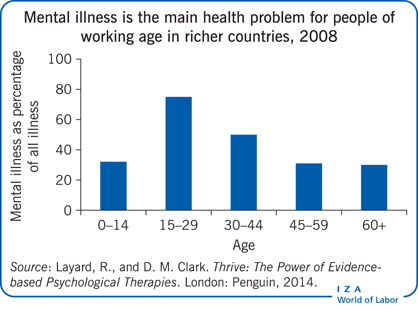Elevator pitch
In a typical country, one in five people suffers from a mental illness, the great majority from depression or crippling anxiety. Mental illness accounts for half of all illness up to age 45 in rich countries, making it the most prevalent disease among working-age people; it also accounts for close to half of disability benefits in many countries. Mentally ill people are less likely to be employed and, if employed, more likely to be out sick or working below par. If mentally ill people received treatment so that they had the same employment rate as the rest of the population, total employment would be 4% higher, adding many billions to national output.

Key findings
Pros
Mental illness costs billions in welfare payments and lost taxes.
Psychological therapy boosts both employment and output, with gains exceeding the cost of treatment.
Psychological therapy is a bargain: for each $1 spent, roughly $1 is saved on welfare benefits and another $1 is saved on physical health care.
Psychological treatment can reduce a person’s annual physical health care costs by 20%.
Curing all depression and anxiety disorders would boost GDP by some 4%.
Cons
In most countries, only a tiny minority of people with depression or anxiety disorders receive evidence-based psychological therapy.
Nearly one in five adults worldwide suffers from a diagnosable mental illness.
Mental illness accounts for 38% of all illness in rich countries.
People with mental health problems who are also physically ill typically use 60% more physical health care than equally ill people without mental health problems.
The extra physical care of people with a mental illness costs close to 1% of national income.